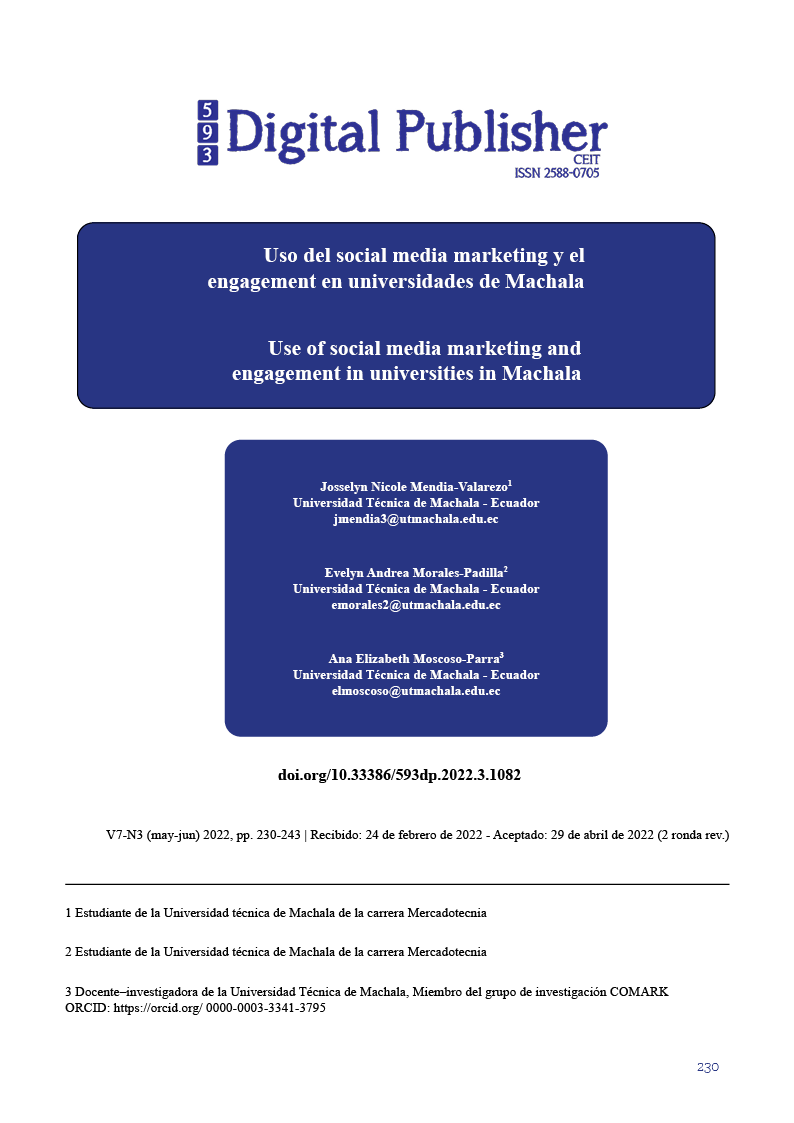Use of social media marketing and engagement in universities in Machala
Main Article Content
Abstract
Social networks have become the most used means of communication by people to interact with each other, and if we speak at an educational level, it is more helpful today to report any type of content through these platforms. The present study analyzes the use of social media marketing and engagement among the universities of the city of Machala, in reference to which social networks are used, what type of content is uploaded in each of them, the level of interactions that they carry out followers through the application of formulas and metrics that will be used we can verify if the engagement is correct for each social network. The research is descriptive, with a qualitative approach applying the direct observation method, the variables used are social media marketing, use, tools, conceptual delimitation, type of content, engagement calculation. The results obtained show a low percentage in the Universities of Machala in terms of Facebook, unlike instagram, the Technical University of Machala (UTMACH) needs to work on content management, on the contrary, where the Metropolitan University (UMET), shows that it has with an optimal percentage of interaction with its users.
Downloads
Article Details

This work is licensed under a Creative Commons Attribution-NonCommercial-ShareAlike 4.0 International License.
1. Derechos de autor
Las obras que se publican en 593 Digital Publisher CEIT están sujetas a los siguientes términos:
1.1. 593 Digital Publisher CEIT, conserva los derechos patrimoniales (copyright) de las obras publicadas, favorece y permite la reutilización de las mismas bajo la licencia Licencia Creative Commons 4.0 de Reconocimiento-NoComercial-CompartirIgual 4.0, por lo cual se pueden copiar, usar, difundir, transmitir y exponer públicamente, siempre que:
1.1.a. Se cite la autoría y fuente original de su publicación (revista, editorial, URL).
1.1.b. No se usen para fines comerciales u onerosos.
1.1.c. Se mencione la existencia y especificaciones de esta licencia de uso.
References
Agurto, R. K., Mogollón, G. F., y Castillo, C. L. (2020). El papel del engagement ocupacional como alternativa para mejorar la satisfacción laboral de los colaboradores. Universidad y Sociedad, 12(4), 112-119. http://scielo.sld.cu/scielo.php?script=sci_arttext&pid=S2218-36202020000400112
Angosto, N. L. (2015). Marketing de contenidos y viralidad. Universidad Politécnica de Cartagena.
Apablaza, C. A., y Codina, L. (2018). Social Media Live Streaming: Estudio de caso y diseño de matriz de análisis. Cuadernos Info(43), 161-180. https://scielo.conicyt.cl/scielo.php?pid=S0719-367X2018000200161&script=sci_arttext
Ballesteros, H. C. (2019). La representación digital del engagement: hacia una percepción del compromiso a través de acciones simbólicas. Revista de Comunicación, 18(1), 215-233. doi:http://dx.doi.org/10.26441/RC18.1-2019-A11
Caguana, B. J., Zambrano, M. M., y Segarra, J. H. (2019). El social network como mecanismo alternativo para la inserción de las PYMES en mercados internacionales. Revista Universidad y Sociedad, 11(1), 231-242. http://scielo.sld.cu/scielo.php?script=sci_arttext&pid=S2218-36202019000100231
Cardenas, F. X., Jimenez, R. C., Holovatyi, M., y Lara, P. P. (2020). El impacto de las redes sociales en la administración de las empresas. Recimundo, 4(1), 173-182. https://recimundo.com/index.php/es/article/view/755
Cardozo, V. S. (2007). La comunicación en el Marketing. Visión Gerencial(2), 196-206. http://www.redalyc.org/articulo.oa?id=465545876009
Cuzquillo Cusquillo, E., Tierra, E., Rivera Abarca, A., y Vergara Zurita, H. (2021). Digital neuromarketing and its importance to develop valuable content in social networks. MktDESCUBRE, 1, 50-61. http://revistas.espoch.edu.ec/index.php/mktdescubre/article/view/561
Dotras, R. A. (2016). Social Media. Herramientas y Estrategias Empresariales. Madrid: RA-MA Editorial.
Enguix, O. S. (2017). Impacto político e informativo de las redes sociales : esferas de actuación y comparación con los medios. Quaderns de Comunicació i Cultura (56), 71-85. http://dx.doi.org/10.5565/rev/analisi.3090
Franco, F. M. (2016). Propiedad, planta y equipo y su relación en los estados financieros de la empresa centro acero. S.A. Universidad Laica Vicente Rocafuerte de Guayaquil. http://repositorio.ulvr.edu.ec/bitstream/44000/1284/1/T-ULVR-1375.pdf
Fuentes, J. P. (2010). La orientación al mercado: evolución y medición de un enfoque de gestión que trasciende al marketing. Perspectivas(25), 25-38. http://www.redalyc.org/articulo.oa?id=425942454004
Galeano, S. (2022). El número de usuarios de internet en el mundo crece un 4% y roza los 5.000 millones (2022). marketing4ecommerce : https://marketing4ecommerce.net/usuarios-de-internet-mundo/
González, O. G., y Vargas, H. J. (2017). La economía circular como factor de la responsabilidad social. Economía Coyuntural, 2(3), 105-130. http://www.scielo.org.bo/scielo.php?pid=S2415-06222017000300004&script=sci_arttext
Jiménez, M. G., y Pérez, C. C. (2021). Las redes sociales como herramienta de comunicación entre públicos: endorsement marketing como forma de publicidad. Sevilla: Universidad de Sevilla. https://hdl.handle.net/11441/106274
León, A. J., Bastidas, Z. L., y Ruiz, P. E. (2017). Impacto de las redes sociales en la difusión de servicios tecnológicos en las empresas del Ecuador. Dominio de las Ciencias, 3(2), 770-784. https://dialnet.unirioja.es/servlet/articulo?codigo=6325887
Llanes, R. P., y Viltres, S. H. (2021). Social media marketing en empresas agrícolas cubanas. Revista de la Facultad de Ciencias Económicas y Administrativas., 22(1), 163-179. doi:https://doi.org/10.22267/rtend.202102.159
López, C. F., y Chiclana, C. (2017). Engagement, una plataforma para el desarrollo de la persona. Comunicación y Hombre(14), 53-62. http://www.redalyc.org/articulo.oa?id=129453532003
López, O., Beltrán, C., Morales, R., y Cavero, O. (2018). Estrategias de marketing digital por medio de redes sociales en el contexto de las PYMES del Ecuador. CienciAmérica: Revista de divulgación científica de la Universidad Tecnológica Indoamérica, 7(2), 39-56. https://dialnet.unirioja.es/servlet/articulo?codigo=6553438
Mentino . (2021). Estado Digital Ecuador Actualización Julio 2021. Mentino : https://www.mentinno.com/estadodigitalecuador/
Montells, L. (2021). Engagement en Instagram: qué es y cómo calcularlo. Metricool: https://metricool.com/es/que-es-el-engagement-en-instagram-y-como-puede-ayudarte/
Moreno, C. K., Romano, C. M., y García, A. M. (2020). Gestión del conocimiento de social media marketing, para aumentar las ventas de las micro-empresas de servicios, cuyos clientes son parte de una comunidad universitaria. Revista GEON (Gestión, Organizaciones Y Negocios), 7(1), 112-128. doi:https://doi.org/10.22579/23463910.186
Orlandini, G. I., Tellez, F. C., & Miranda, Q. E. (2016). Social Media Marketing y la reputación online de las empresas hoteleras del sur de Bolivia. Investigación y Negocios, 9(13), 40-48. http://www.scielo.org.bo/scielo.php?pid=S2521-27372016000100007&script=sci_abstract&tlng=en
Ortega, J. N., Yaruro, P. B., y Pérez, R. L. (2021). Definición de las necesidades de los emprendedores patienses respecto al uso del social media marketing en sus modelos de negocio. Universidad Libre.
Otero, R. L., Calvo, D. M., y Llamedo, P. R. (2020). Herramientas digitales para la comunicación, la tele-docencia y la tele-orientación educativa en tiempos de COVID-19. Revista de Orientación Educativa AOSMA(28), 92-103. https://dialnet.unirioja.es/servlet/articulo?codigo=7381639
Plaza, C. X. (2014). Consulta de las redes sociales y la incidencia en la decisión de compra del consumidor guayaquileño. Observatorio de la Economía Latinoamericana,(193), 85-96. https://www.eumed.net/cursecon/ecolat/ec/2014/redes-sociales-consumidor.html
Ramos, J. (2016). Marketing de contenidos. Guía práctica. XinXii.
Rodríguez, H. B., Pérez, B. D., y Saura, L. J. (2017). Clasificación de información en redes sociales. Análisis de contenido en Twitter de empresas de comercio electrónico. Revista Espacios, 38(52), 1-16. http://www.revistaespacios.com/a17v38n52/17385217.html
Ure, M. (2018). Engagement estratégico y encuentro conversacional en los medios sociales. Revista de Comunicación, 17(1), 181-196. http://www.scielo.org.pe/pdf/rcudep/v17n1/a11v17n1.pdf
Villagómez, M. A., y Acosta, G. E. (2020). Uso de redes sociales digitales como estrategia de mercadotecnia en pymes pirotécnicas de Tultepec en el estado de México. Revista De Comunicación De La SEECI(52), 73-93. https://doi.org/10.15198/
Zeler, I., Oliveira, A., y Malaver, S. (2019). La gestión comunicativa de las empresas vitivinícolas de España en las principales redes sociales / Communication management of Spanish wine companies in the main social networks. Revista Internacional de Relaciones Públicas, 9(18), 161-178. http://revistarelacionespublicas.uma.es/index.php/revrrpp/article/view/617




